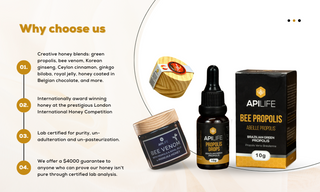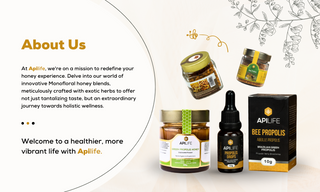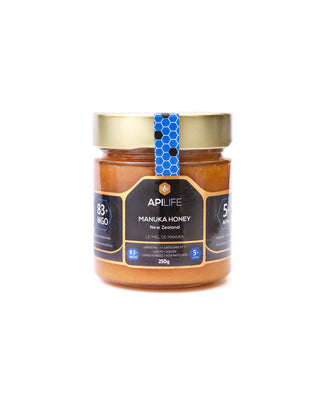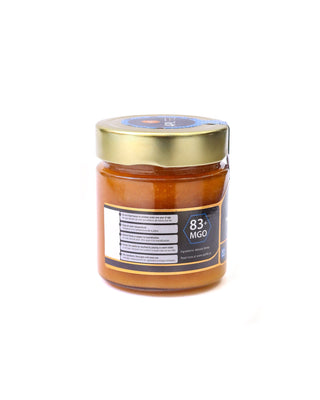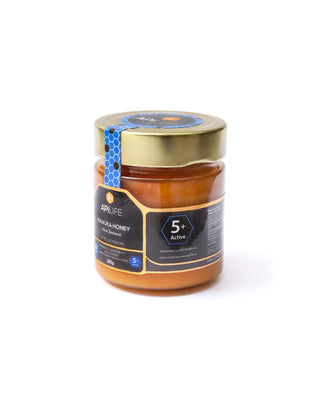Explore the Manuka Symphony: Unlocking the Power of UMF Grades
Awaken your inner wellbeing with UMF Manuka Honey, a vibrant symphony of nature's wisdom sourced from the sacred soil of New Zealand's Golden Triangle. Forget run-of-the-mill, local honey; this is a potent elixir, carefully nurtured from flower to jar, offering a range of potential health benefits tailored to your needs.
UMF - Your Guide to Nature's Harmony:
Manuka honey's unique composition resonates with your inner rhythm through its UMF (Unique Manuka Factor) and MGO (Methylglyoxal) content. As the UMF grade ascends, the symphony of potential benefits expands:
Just one pure note - 100% raw, unpasteurized New Zealand Manuka honey (Leptospermum scoparium). Our bees hum their happy tunes while gathering nectar from pristine Manuka blossoms, infusing each jar with nature's magic.
UMF 5+: Your Daily Dose of Wellbeing
Don't underestimate the power of UMF 5+. This grade represents the foundation of your holistic journey, offering gentle yet effective support for everyday wellness:
- Soothe occasional throat discomfort: Let the warmth and natural properties of the honey work their magic.
- Promote digestive harmony: Support a balanced gut microbiome with a natural approach.
- Fuel your day with pure energy: Enjoy a naturally delicious source of energy without the refined sugars.
- Embrace wellness rituals: Integrate this versatile honey into your daily routines for a mindful approach to wellbeing.
Simple Indulgences:
- Start your day with a spoonful: Enjoy the pure taste and potential gut-boosting benefits.
- Sweeten your tea or coffee: Replace refined sugars with a touch of natural sweetness.
- Spread it on toast or pancakes: Elevate your breakfast with a decadent and nutritious topping.
- Drizzle it over yogurt or oatmeal: Add a delightful flavor and texture, while potentially supporting digestion.
Wellness Rituals:
- DIY face mask: Mix honey with natural ingredients like clay or avocado for a nourishing and potentially anti-inflammatory treat.
- Soothing cough syrup: Combine honey with lemon and ginger for a natural remedy to soothe occasional throat discomfort.
Beyond Local: The Symphony of Nature in New Zealand
While Canadian honey holds its own unique charm, New Zealand's Golden Triangle offers a stage where Manuka trees flourish under specific climatic and volcanic soil conditions. This unique environment results in a honey naturally richer in beneficial compounds, making it a potent choice for your holistic journey.
We don't just say our honey is pure, we stand behind it. In fact, we're so confident in the quality of our ingredients that we offer a $5,000 CAD guarantee for any proven instance of adulteration. Every batch of our Manuka honey undergoes rigorous lab testing for authenticity and purity, and we proudly hold certificates to prove it. Additionally, we participate in prestigious International Honey Competitions every year, where our honey consistently receives top honors for its flavor and quality. This is not just any honey; it's a commitment to excellence, from hive to jar.
Shop with us and score free shipping on orders over $50! Once you've placed your order, we hustle to get it out the door. Expect your goodies to arrive in Canada within 2-3 days, and in the US, 4-5 days. We provide tracking for peace of mind, but remember, the postal service can have its off days, causing rare but occasional delays beyond our control. We're all about smooth sailing, but we appreciate your understanding on those odd bumpy rides!
Not quite what you expected? No worries at all. We offer hassle-free, FREE 14 day returns within Canada and the US, making it rare and stress-free for you. No matter the reason, no questions asked. Just peace of mind knowing you can make returns without any extra cost. It's all about ensuring you have the best shopping experience with us, worry-free and secure.
Explore the Manuka Symphony: Unlocking the Power of UMF Grades
Awaken your inner wellbeing with UMF Manuka Honey, a vibrant symphony of nature's wisdom sourced from the sacred soil of New Zealand's Golden Triangle. Forget run-of-the-mill, local honey; this is a potent elixir, carefully nurtured from flower to jar, offering a range of potential health benefits tailored to your needs.
UMF - Your Guide to Nature's Harmony:
Manuka honey's unique composition resonates with your inner rhythm through its UMF (Unique Manuka Factor) and MGO (Methylglyoxal) content. As the UMF grade ascends, the symphony of potential benefits expands:
Just one pure note - 100% raw, unpasteurized New Zealand Manuka honey (Leptospermum scoparium). Our bees hum their happy tunes while gathering nectar from pristine Manuka blossoms, infusing each jar with nature's magic.
UMF 5+: Your Daily Dose of Wellbeing
Don't underestimate the power of UMF 5+. This grade represents the foundation of your holistic journey, offering gentle yet effective support for everyday wellness:
- Soothe occasional throat discomfort: Let the warmth and natural properties of the honey work their magic.
- Promote digestive harmony: Support a balanced gut microbiome with a natural approach.
- Fuel your day with pure energy: Enjoy a naturally delicious source of energy without the refined sugars.
- Embrace wellness rituals: Integrate this versatile honey into your daily routines for a mindful approach to wellbeing.
Simple Indulgences:
- Start your day with a spoonful: Enjoy the pure taste and potential gut-boosting benefits.
- Sweeten your tea or coffee: Replace refined sugars with a touch of natural sweetness.
- Spread it on toast or pancakes: Elevate your breakfast with a decadent and nutritious topping.
- Drizzle it over yogurt or oatmeal: Add a delightful flavor and texture, while potentially supporting digestion.
Wellness Rituals:
- DIY face mask: Mix honey with natural ingredients like clay or avocado for a nourishing and potentially anti-inflammatory treat.
- Soothing cough syrup: Combine honey with lemon and ginger for a natural remedy to soothe occasional throat discomfort.
Beyond Local: The Symphony of Nature in New Zealand
While Canadian honey holds its own unique charm, New Zealand's Golden Triangle offers a stage where Manuka trees flourish under specific climatic and volcanic soil conditions. This unique environment results in a honey naturally richer in beneficial compounds, making it a potent choice for your holistic journey.
We don't just say our honey is pure, we stand behind it. In fact, we're so confident in the quality of our ingredients that we offer a $5,000 CAD guarantee for any proven instance of adulteration. Every batch of our Manuka honey undergoes rigorous lab testing for authenticity and purity, and we proudly hold certificates to prove it. Additionally, we participate in prestigious International Honey Competitions every year, where our honey consistently receives top honors for its flavor and quality. This is not just any honey; it's a commitment to excellence, from hive to jar.
Shop with us and score free shipping on orders over $50! Once you've placed your order, we hustle to get it out the door. Expect your goodies to arrive in Canada within 2-3 days, and in the US, 4-5 days. We provide tracking for peace of mind, but remember, the postal service can have its off days, causing rare but occasional delays beyond our control. We're all about smooth sailing, but we appreciate your understanding on those odd bumpy rides!
Not quite what you expected? No worries at all. We offer hassle-free, FREE 14 day returns within Canada and the US, making it rare and stress-free for you. No matter the reason, no questions asked. Just peace of mind knowing you can make returns without any extra cost. It's all about ensuring you have the best shopping experience with us, worry-free and secure.
See what our customers have to say
